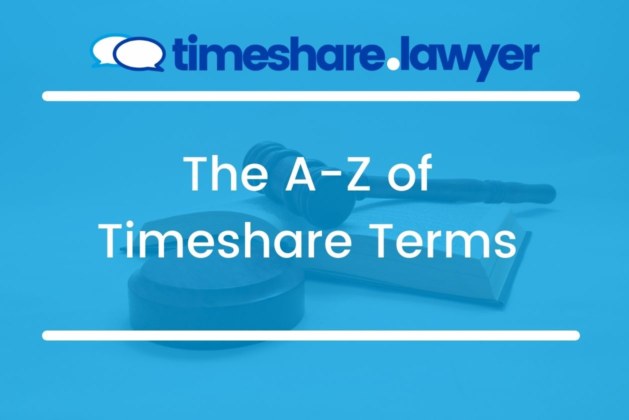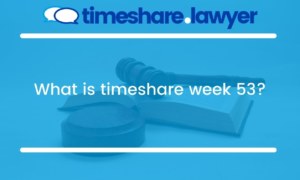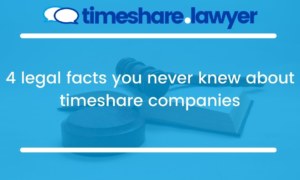The world of timeshare is full of very specific terms that might be confusing to anyone not within the industry. In our constant quest to keep things clear and simple, we’ve put together this, rather exhaustive, guide to the A to Z of timeshare jargon you might come across. Let us know if you think we’ve missed anything that we should add in!
Abogado
Spanish word meaning ‘lawyer’
Accrued Time
A term used by timeshare exchange companies to mean weeks that have been accumulated from previous years that can be used in the current year.
Affiliated
Affiliate resorts are those with whom your exchange company has an agreement so that you may stay with those resorts as part of your exchange contract.
Appartado (de Correos)
Spanish phrase meaning ‘P O Box’
Banking
Exchange companies have what they call a ‘bank’, into which a week of timeshare can be deposited. It can also be known as ‘Space Banking’. You may also hear the term ‘Block Banking’ or ‘Bulk Banking’ which means that the resort management (usually) deposit a large number of weeks into the exchange company ‘bank’ at the earliest possible time. The aim of this is to give members the maximum bargaining power for their timeshare exchange.
Biennial
Biennial means ‘every other year’ and, in timeshare, refers to the use of a fixed week on alternate years. Members of this type might be classified as ‘Odd’ or ‘Even’ year members.
Blue Week
In RCI’s exchange programme, low demand timeshare weeks (generally low season) are designated as ‘blue’ weeks (see infographic)
Bonus Time or Bonus Week
These are terms meaning an additional week of use which can sometimes be given to a member as a goodwill gesture or as a ‘thank you’ for signing up. It is sometimes also offered in cases where additional weeks are temporarily available. Sometimes a small charge is payable.
‘Buy/Sell’
This is a form of (usually) fraudulent timeshare scam in which a buyer is promised that their existing timeshare will be sold against the cost of a new purchase.
Club/Trust System
Members belong to a club and the accommodation unit and any associated facilities at the resort are held by Trustees. These Trustees licence a ‘Right to Use’ for members.
Class Action
In a class action lawsuit, a group of individuals band together to make a claim. However, this is only applicable in the United States and not allowed in European Courts.
Code of Conduct
The Code of Conduct is a set of regulations drawn up by a Consumer Body that affect the standards of trading that must be adhered to by both the seller and the consumer. These Codes of Conduct exist to protect consumers, as well as sellers, from wrongdoing and thus improve consumer confidence in the product or service they are purchasing.
Cold Line
This is a colloquial term often used within the timeshare industry to refer to the sales team who make sales to consumers from outside the resort. These ‘cold lines’ are less used these days, but can refer to those scammers on the street that approach you with scratch cards or the offer of free gifts while you’re out and about.
Constitution
The Constitution is, effectively, the rules by which the timeshare resort is run. It is the set of legal documents which establish the relationship between the different parties in the timeshare resort, and includes the owner, developer, trustee, and management company.
Cooling Off Period
This is a legally required period in which the consumer has time to consider their purchase and to change their mind if they wish. No payment can be taken during this time, and if the consumer wishes to cancel within the cooling-off period, there will be no obligation to pay any sums at all. This period is usually 14 days.
Deeded
The Deeded system refers to the outright ownership of a timeshare week, secured by ‘Deed of Title’ and often registered at the central Land Registry. However, deeded timeshares are not legal in the UK (therefore the Club/Trust system prevails here). In Spain, the Escritura system is a Deeded system.
Destination Club
Similar to a holiday club, a destination club promises access to timeshare accommodation. However, there is no certainty over rights of access to that accommodation.
Developer
The developer is the company that owns the freehold to the timeshare resort. It is they who construct the accommodation and facilities. They earn their profits from the initial sale of the units to timeshare members.
Developer’s Price
This is a sum estimated by resale companies to illustrate the savings to be made by buying with them. It refers to the full timeshare unit retail price of the developer.
End-user Finance
This is a loan granted to a consumer in order to purchase a timeshare. This is an unsecured loan arranged by the selling agent and usually in collaboration with an outside finance company.
Escritura
This is a Spanish term referring to the Deeding and Registration of a ‘Deed of Title’ (see Deeding above).
Escrow Account
This is an account wherein money and assets, such as the Ownership Certificate, are held by a third party until the terms of a purchase agreement are satisfied. The third party is usually an accountant or solicitor. Once all is in agreement, both parties then agree to release the money to the seller and issue the Seller’s Certificate to the buyer.
Exchange Company
The Exchange Company arranges for you to exchange your timeshare with a unit in an Affiliated resort. There is an Exchange fee for this and usually also a Membership fee. These are usually separate to your timeshare contract, hence the additional fee. The major exchange companies include RCI and Interval International (II).
Exit Program
Sometimes offered by timeshare companies, an Exit Program exists to allow timeshare members to buy their way out of their contract. This is usually an expensive option, but one of the few that is readily available. In order to exit your timeshare legally, easily and in a more cost-effective way whilst getting full justice and potentially compensation, you should contact the team at Timeshare.lawyer rather than go through your timeshare company.
Factoring Fee (‘Factorial’)
This is a term used in Scotland and refers to the profit markup of the Management Company and included in the Management Agreement.
Fixed Time
A fixed time (or fixed week) contract means that your membership is for a specific week in a specific unit at the timeshare resorts. It is the same every year.
Floating Time
Floating weeks are now coming under legal scrutiny and are actually already illegal in some countries. These contracts allow the member an unspecified week in an unspecified unit and often in an unspecified resort. The member needs to book way in advance to secure the exact dates desired, which they do in competition with all the other members. If they cannot or do not book their chosen week, they must wait for a week to be allocated to them each year.
Fly-Buy
These are holiday packages in which the resort pays some or all of the cost of a holiday on the promise that the holidaymaker will attend a sales presentation and/or tour of the resort. Though this can be a place where you come under some pressure and may have to endure a long and arduous presentation, if you can resist the lure then it’s a good deal. Of course, you are under absolutely no obligation to buy anything whatsoever, and if you do find yourself persuaded to sign up, there is always the 14-day cooling-off period in which you can cancel.
Fractional Ownership
A small group of members, usually around a dozen, decide amongst themselves how the timeshare weeks are shared between them. It is halfway between a timeshare and full ownership of the unit.
Green Week
Interval International (II) designates low demand timeshare weeks (generally in low season) as ‘green weeks’ (see infographic)
Group Ownership
Just another term for ‘timeshare’
Guest Certificate
A guest certificate is issued by the Exchange Company and authorises a nominated guest (your friend or family member) to use the timeshare exchange instead of you.
Hacienda
This is the name of the Spanish Tax Office.
Holiday Club
A Holiday Club promises you a week or weeks’ holiday in what is usually timeshare accommodation.
Internal Personal Contacts
These are sales staff whose job is to sell additional timeshare products or units to existing members.
IVA
This is the abbreviation for the Spanish version of VAT.
Leisure Charge
Sometimes charged in addition to your maintenance fees for the use of leisure facilities at the resort. These are those which are shared with other guests and members.
Levy
This is a charge usually made to members of a timeshare points club in order to pay for club admin. It’s payable in addition to maintenance fees and other charges that might be made for the use of your timeshare week. A Levy may also refer to a one-off charge by the Owners’ Club or Management company in order to pay any major or unexpected costs.
Like for Like
Most Exchange Companies offer an exchange of similar quality and popularity to that which has been put into the exchange bank.
Linked Agreement
Beware of Linked Agreements, which exist as a method of circumventing the laws related to the taking of deposits. The salesperson may make it seem that two agreements (i.e. the Timeshare Purchase Agreement and some sort of extra holiday scheme or voucher) are unrelated, but this is not the case and breaches the law.
Lock Off
An accommodation unit that can be divided into two independent units that each have their own access.
Maintenance Fees
Sometimes called ‘Management Fees’, these are the annual fees that are paid by the timeshare member to cover the day-to-day running costs of the resort.
Management Company
Usually owned or controlled by the resort Developer, the Management Company is contracted to carry out the day-to-day management of the resort for which you pay your maintenance fees.
Marketing Company
The Marketing Company is, as the name suggests, responsible for marketing and is separate from the Developer. Though the Developer may handle the on-site marketing, they probably employ a separate Marketing Company to manage any marketing that goes on elsewhere, such as online or at other resorts or locations.
Occupancy Size
The Occupancy Size of a unit refers to the number of individuals that can use the unit. Usually comprised of two numbers, the first number is the total capacity of the unit when allowing for additional beds etc. The second number is for the number of people that can have total privacy (private access to bathroom and so on), which more realistically represents the occupancy size of the unit.
OPC (Off Premises Contact)
An OPC is a salesperson whose job it is to get people to attend a sales presentation using the Cold Line method from premises away from the resort itself.
OTE
Now the RDO (Resort Development Organisation), the trade body for timeshare was previously called OTE, the Organisation For Timeshare In Europe.
Owners’ Club
All timeshare resorts have an Owners’ Club, to which all timeshare members at the resort belong. Sometimes the Owners’ Club is a company, but is generally just a Members’ Club.
Ownership Certificate
This Certificate confirms your right to use or the title to the property. It may also be referred to as a Holiday Certificate or Timeshare Certificate.
Patrimonio
Spanish term for ‘Wealth Tax’
Perpetuity
The word in itself means ‘forever’, which gives you some idea of what it means when it shows up in your timeshare contract. It is now illegal for a timeshare contract to exceed a maximum of fifty years.
Plus Valia Tax
Spanish version of Capital Gains Tax
Points Clubs
As a member of a timeshare Points Club, you hold points which entitle you to use a certain period in a unit each year from a set choice of resorts. There has been some controversy over Points Clubs in recent years, and in many cases they are being ruled to be illegal.
Private Residence/Vacation Club
A kind of high-end Fractional Ownership.
Property Bonds
Similar to Points Clubs, Property Bonds are a system for owning shares or bonds in a company that owns timeshare properties.
Qualified Prospect
A Qualified Prospect is a term used by developers and timeshare marketers to describe consumers of the general demographic most likely to buy timeshare. This comprises factors such as the consumer’s income, marital status, homeowner status, and age.
Recourse Agreement
This is an agreement between a Developer and a Finance Company where the Developer pays of outstanding debts if the consumer with the finance agreement defaults.
Red Week
Both RCI and Interval International designate high season, high desirability timeshare weeks as ‘red’. Those with a ‘red week’ ownership are usually allowed to exchange any week throughout the year as these are usually the most expensive to buy (see infographic)
Repossession
The Club or Management Company can remove your rights to use for breaching the Constitution. This usually occurs as a result of non-payment of Maintenance Fees. These rights will then be sold to cover the debt. Repossession cannot occur on Deeded property.
Resale Brokers/Agents or Resellers
These are companies whose business is to either buy timeshare weeks from existing owners for the purpose of selling them on to new owners, or to act as agents that put sellers and buyers in contact to facilitate a timeshare sale. They make money, usually, by charging commission on the sale.
Resort Development Organisation “RDO”
Previously the OTE, the RDO is the trade body that governs timeshare.
Right to Use
This is the legal term for the licence granted by Trustees to a timeshare holder.
Sales Inspection Visit (‘SIV’)
A term used by Developers for prospective buyers to stay at a resort for a few days at a low fee, on condition they attend a sales presentation.Though there’s no obligation to buy, the SIV is a promotional tool to encourage a purchase. See also Fly-Buy.
Season
Weeks in a year are divided into different segments by Exchange Companies, usually signified by a colour. These vary for different Exchange Companies, with Interval International (II) and RCI having their own separate coding system. Each segment represents different levels of trading power and monetary value based on the season’s popularity (see infographic)
Sinking Fund
A Sinking Fund or Sink Fund is a portion of your Maintenance Fee that is dedicated to keeping the furniture, fittings, main structure, and sometimes the leisure facilities of the resort in perfect condition for the full period of your membership.
Space banking
Depositing a week of timeshare with an Exchange Company. See also Banking.
SPIFF
Special Incentive Bonus For Future Sales, or SPIFF for short, is a commission payment sometimes received by timeshare salespeople as an incentive to sell.
Timeshare Directive
A European Parliament order to all nation states within the EU to implement Timeshare laws
Timeshare Interval
The period for which you are permitted to use your timeshare unit.
Trading Power
The Trading Power of a timeshare week refers to its value. It’s used by Exchange Companies to ascertain what equivalent exchange unit and resort you can be offered in exchange for your own. This is influenced by factors such as the size of your unit, the popularity of your timeshare week, the quality or star rating of the resort, and the popularity of the resort itself.
Trustees
Timeshare Trustees can be a bank, a group of individuals, or a Trust company that holds the accommodation in trust on behalf of the timeshare holders. It is they who grant you the Right to Use through the Ownership Certificate. Some have added responsibilities, like ensuring the continuity of the Owners’ Club, but all Trustees have the role of providing security to owners should the developer go bust.
Warm Line
Unlike Cold Line, the Warm Line sales team work to make sales of timeshare to visitors and existing timeshare holders staying at the resort.
Week 53
Of course, there are only 52 weeks in a year. However, based on the timeshare calendar, every seven years or so, a 53rd week comes up. This is generally reserved for the Developer or Founders.
White Week
RCI’s exchange programme designates any timeshare weeks falling at a time of year with ‘intermediate’ demand (between high and low season) as white (see infographic)
Have we missed any key terms you were looking for? Do drop us a line and we will get it added to the list. If you require any further information on any of the terms listed here, or on a different matter related to your timeshare, please don’t hesitate to get in touch. 0800 0239 032 or info@timeshare.lawyer



